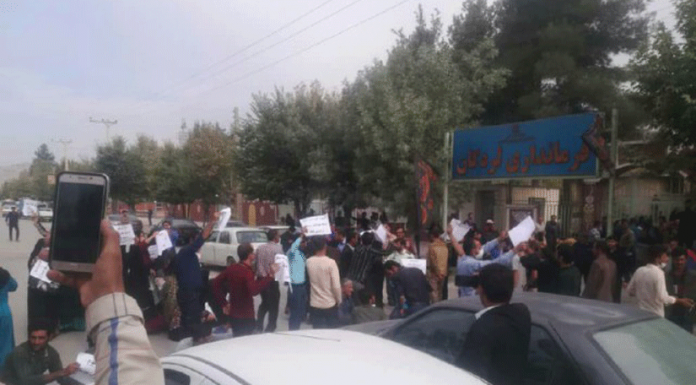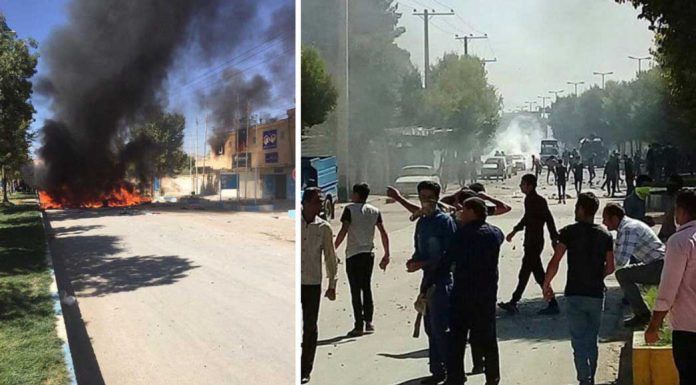Residents of Chenare Mahmudi village, in the southwestern province of Chaharmahal and Bakhtiari, have accused a health care worker at the local medical center of infecting hundreds of people with HIV by using contaminated syringes while administrating blood glucose diabetes tests to the members of their community earlier this year. According to unconfirmed reports, as many as 200 inhabitants of Chenare Mahmudi have so far tested positive for HIV.
Villagers held a massive protest in front of the Lordegan County Hall on October 2, demanding answers from local authorities and the Ministry of Health and Medical Education. Protesters held signs that said: “HIV, Infected Syringes. Health Network. People Victimized,” “Village Health Center Infecting Residents with HIV Virus,” and “The Silent Deaths of AIDS Victims.” They called on the Judiciary to bring the alleged culprit to justice.
Iranian press and broadcast media reported the HIV outbreak in Chenare Mahmudi only after footage appeared on social media showing angry protesters breaking the windows of the health center and throwing drugs out in the street. The government’s reluctance to investigate the incident thoroughly and release accurate information on the issue has led to the spread of rumors among the villagers and to the protests.
Shortly after the protests, Ahmad Reza Bahrami, the prosecutor for Chaharmahal and Bakhtiari Province, announced that his office had launched an official investigation into the accusations of wrongdoing by a local health worker.
“Some people have claimed that a health worker at a local medical center had used a single syringe to take blood samples from the villagers during a glucose diabetes test,” Mr. Bahrami was quoted by the Islamic Republic News Agency (IRNA) as saying. “Local authorities have arrested the person in question. The Judiciary and other agencies are investigating the incident.”
Kiyanoush Jahanpour, the head of the communications department of the Ministry of Health and Medical Education, has, however, argued that it would be medically impossible for HIV to spread so rapidly among the population in such a short amount of time.
Jahanpour explained: “There is no evidence that a single source caused HIV infection to spread in the district in such a short time. It is more likely that it started between seven to ten years ago.”
Doctor Mohammad Mehdi Gouya, the director-general of the Health Ministry’s Center for Disease Control and Prevention, has also dismissed claims that the diabetes blood test was the source of the HIV infection in the village of Chenare Mahmudi.
Kayhan Life spoke to Kh. Mahmudi, a resident of Chenare Mahmudi, about events leading to the HIV infections in that village.
“In the spring of this year, the local health officer for the village announced that the county medical center was offering free blood sugar tests for the residents,” Mahmudi said. “The health worker and another person we had never seen before took blood samples from many people in the village. Around 12 days later, the health worker asked all those who had already given blood samples to return to the clinic for another test. He did not explain the reasons for a second blood test.”
Asked about what had initially alarmed the villagers, Mahmudi explained: “About two months ago, a middle-aged man from our village began experiencing persistent high temperatures and shaking chills. He visited a doctor in Lordegan county who could not diagnose his illness. So he went to a clinic in the capital city Shahr-e Kord, where doctors suspected he had AIDS. Subsequent tests confirmed their initial diagnosis and showed he had HIV. The man was, however, too embarrassed to tell anyone and kept his illness a secret.”
“Meanwhile, the man’s nephew, who is between 10 and 15 years old, was showing similar symptoms as his uncle,” Mahmudi added. “So he took his nephew to the same doctor in Shahr-e Kord. The boy tested positive for HIV. He, however, did not keep his illness a secret from the villagers and was telling everyone he would die of AIDS. Subsequently, every member of that family gave a blood sample, and the situation became critical when several of them tested HIV positive. The doctors urged all close relatives of those infected to be tested.”
Mahmudi pointed out: “Several media outlets have published incorrect data. According to the test results, more than 60 people have tested HIV positive. We are waiting for the results of the blood tests for another 500 people suspected of having AIDS. We believe many more people will test positive, but they will keep their illness a secret, fearing the government will label them as addicts or perverts. Several families moved to Isfahan and Shiraz [in central Iran]. We do not know the results of their blood tests.”
Asked why the villagers blamed the head of the local clinic given the government has described the accusations as baseless and the Judiciary has found no evidence of wrongdoing, Mahmudi replied: “This person was a community health worker in the village for seven years before becoming the head of the local clinic. He is from Chenare Mahmudi and has a family and several relatives here. However, he was fighting with several villagers over a piece of land.”
Mahmudi noted: “He did not have a good relationship with the local community. People reportedly had heard him wishing death on the population of the entire village. He did not take blood samples from any member of his family on the day he tested other villages for diabetes. He even turned away his sister-in-law, who was queuing with other women, telling her she did not need a blood test. So many people are now living with AIDS.”
Mahmudi and his wife are HIV positive. He is very critical of the Minister of Health and Medical Education Saeed Namaki.
“The Health Minister has implied we are a bunch of perverts. That is unethical behavior. Let us put young people aside for a moment. Does it make any sense to suspect a 70-year-old woman or an 80-year-old man or children as young as 4 and 10 years old of engaging in promiscuous behavior and developing AIDS in such a short time? We have been living in this village for many generations. We are chaste and dignified people. We do not understand why the health minister insults us instead of investigating the incident,” Mahmudi added.
According to Mahmudi, except for some people who smoke opium, there are no other drug addicts in the village who use needles. Mahmudi insisted that the claim that the virus had spread by addicts sharing infected needles was utterly unfounded. Mahmudi told Kayhan Life that many of the men in the village who worked for the Lordegan Petrochemical Company and the National Iranian South Oil Company had not gone back to work after finding they had AIDS.
Mahmudi, who works for the Lordegan Petrochemical Company, believes the company would want to see the result of all the blood tests before allowing anyone to return to work. So far, 10 members of Mahmudi’s family and close relatives have tested HIV positive.
“No one has helped the villagers so far. Those infected have not received any medical care and treatment. The government has said we should wait until it has the results for all the blood tests,” Mahmudi added.
According to Mahmudi, the Judiciary has not provided adequate information to the villagers, particularly those with AIDS. It has insisted that the investigation and the community health worker’s confession were confidential.
[Translated by from Persian by Fardine Hamidi]



